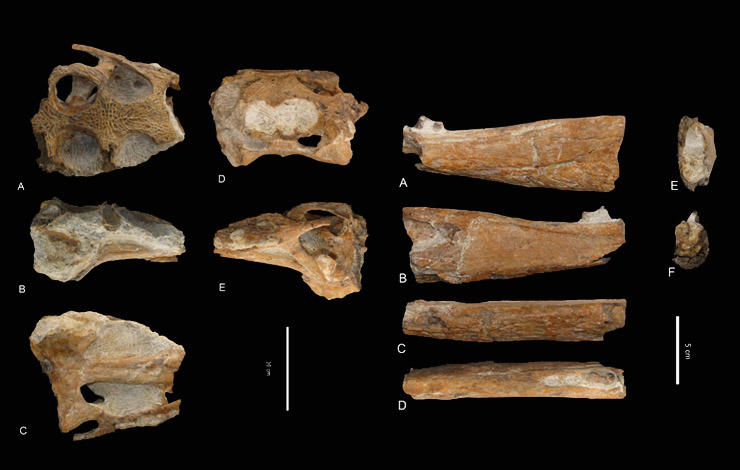07-12-2018

A new species of fossil crocodile from Portugal changes what scientists thought about the origin of crocodiles. Crocodile-like reptiles, the crocodylomorphs, existed since the early days of dinosaurs. However, true crocodiles, belonging of the clade Crocodylia, like the 95 million years old new species Portugalosuchus azenhae found in Portugal pushes back 20 million years the origin of true crocodiles according to the study by the paleontologists from University Nova of Lisbon and University of Coimbra, in Portugal.
"This fossil is unique in its anatomy and key piece to understand the early stages of crocodiles, as the oldest of the group we call the Crocodylia, the true crocodiles" says the leading author Octávio Mateus, paleontologist at University NOVA of Lisbon, in Portugal.
This new fossil based on a partial skull and lower jaw exhibits a series of characters not seen in any other species, allowing its assignment to a new name Portugalosuchus azenhae. Eduardo Puértolas-Pascual, expert in fossil crocodiles from University NOVA of Lisbon, and co-author of the study, explains the importance of the anatomy of the jaw "the mandible has an opening that helps to define what is a true crocodile in contrast with crocodile-like reptiles, the crocodylomorphs, that weren't yet part of the group Crocodylia, and didn't have this opening in the jaw bones". The results of a lineage studies place this specimen within Crocodylia, as the sister group to all other crocodylians but not the gharials. Therefore, this Portuguese specimen represents the only well-documented and valid species of this kind for its age in Europe, and the oldest representative of Crocodylia known so far, helping to fill a gap in the fossil record. In addition, the discovery of this new species sheds light on the radiation and the origin of Crocodylia, which probably would have taken place in Europe.
The skull was found by Matilde Azenha, that is now honoured with the species name Portugalosuchus azenhae. The fossil that comprises a skull and jaw, was collected near Tentúgal in central Portugal will be soon on display at Museu da Lourinhã.
The study was published in the prestigious "Zoological Journal of the Linnean Society".
Press
"O fóssil de crocodilo mais antigo do mundo é de Tentúgal" (Público)
"Portugal tem o mais antigo fóssil de crocodilo do mundo - paleontólogos" (Porto Canal)
"Fóssil de crocodilo mais antigo do mundo descoberto em Portugal" (Tvi24)
"Portugal tem o mais antigo fóssil de crocodilo do mundo"(Notícias ao minuto)
"Portugal tem o mais antigo fóssil de crocodilo do mundo - paleontólogos" (RTP)
"Portugal tem o mais antigo fóssil de crocodilo do mundo - paleontólogos" (O Jogo)
"Portugal tem o mais antigo fóssil de crocodilo do mundo" (Sábado)
"Portugal tem o mais antigo fóssil de crocodilo do mundo" (Sapo)
"Paleontólogos portugueses descobrem nova espécie: o mais antigo crocodilo fóssil conhecido"(Diário online Região Sul)
"Paleontólogos portugueses descobrem o mais antigo crocodilo fóssil do mundo em Tentúgal" (Observador)
"Fóssil de crocodilo mais antigo do mundo foi descoberto em Tentúgal"(Foz ao minuto)
"Descoberto em Portugal o mais antigo crocodilo fóssil do mundo" (TSF)
"Paleontólogos descobrem em Portugal o mais antigo fóssil de crocodilo do mundo" (Expresso)
Maior fóssil de crocodilo do mundo está em Portugal (Jornal de Notícias)
"Portugal tem o fóssil de crocodilo mais antigo do mundo"(Sol)
"Portugal tem o mais antigo fóssil de crocodilo do mundo. Encontrado em Montemor-o-Velho!" (Notícias de Coimbra)